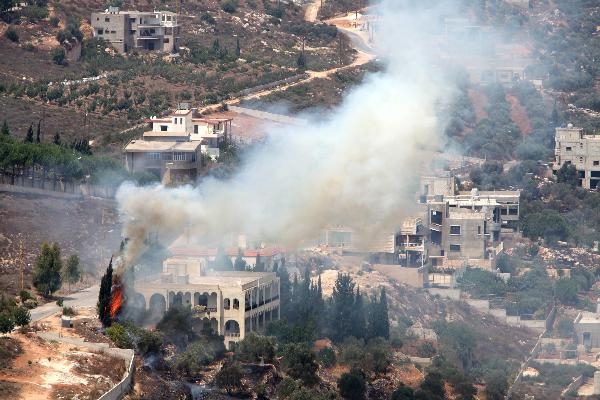Lebanon, Israel -- A return to war?
The 64-million-dollar question in the Middle East right now is whether war is about to erupt between Israel and its northern neighbor, Lebanon.
 |
|
A fire is seen on the Lebanon side of the Israel-Lebanon border following the fire exchange that took place this afternoon between Israeli and Lebanese troops, Aug. 3, 2010. [Jini/Xinhua] |
In Israel there is no clear answer, with analysts admitting they are confused by Tuesday's incident in which cross-border fire left around five people dead.
As opposed to previous similar episodes, this time the shooting from the Lebanese side of the border was carried out by soldiers within the Lebanese army. Previously the attacks came from the Iranian- and Syrian-backed Shiite Hezbollah militia.
Speaking on Hezbollah's TV channel just hours after the shooting, the south Lebanese-based organization's Secretary- General Hassan Nasrallah said the movement was not involved this time but should Israel attack the Lebanese army once again Hezbollah will retaliate.
For its part, Israel said all it was doing on Tuesday was clearing obstacles on its side of the border fence, in coordination with the United Nations UNIFIL peacekeeping force.
At that point, at least one Lebanese sniper opened fire on Israeli positions in what Israel claims was a premeditated attack. In trying to prove its side of the story, Israel points to the fact that several journalists had been brought to the Lebanese side of the frontier ahead of time in order to film the incident.
Both countries have lodged formal complaints with the UN, which in turn, fearing an escalation in violence, has called on the parties involved to show "maximum restraint."
Confused picture
Before considering whether Tuesday's occurrence will lead to an outbreak of fighting, analysts are trying to understand the reasoning behind the incident itself and diplomatic events of the last few months.
Ely Karmon, a senior research scholar at the International Institute for Counter-Terrorism at Israel's Interdisciplinary Center, looks back to something he predicted in February of this year.
At that time he told Xinhua that Iran would likely try to persuade its allies -- Syria, Hezbollah and Hamas -- to provoke Israel once serious international pressure was placed on Tehran because of its nuclear program.
One could argue that the latest sanctions coupled with the heightened Israeli and American threats of military strikes might be sufficient for Iran to instruct its allies to move, said Karmon.
However, he accepts that Tuesday's gunfire was carried out by those in official army uniform. As a result, he points to reports in Israel on Wednesday that suggest a new commander was recently appointed within the Lebanese army with responsibility for the zone in which the incident took place. The reports maintain the officer is a staunch Shiite with an affinity with Hezbollah at the very least.
Numerous Israeli experts say Hezollah is now so ingrained in the Lebanese political and military hierarchy that it can demand specific actions from the army. There is also widespread agreement in Israel that Hezbollah's own military is better trained and equipped than the Lebanese army.
 0
0 







Go to Forum >>0 Comments